The Dennis Gabor Lecture
The Department of Electrical and Electronic Engineering’s annual invited lecture honours Dennis Gabor, the inventor of holography. The lecture series focuses on the impact of science and engineering on society.
Dennis Gabor
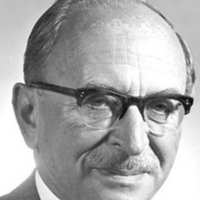 The Hungarian-born electrical engineer Dennis Gabor won the Nobel Prize for Physics in 1971 for his invention of holography, a system of lensless, three-dimensional photography that has many applications.
The Hungarian-born electrical engineer Dennis Gabor won the Nobel Prize for Physics in 1971 for his invention of holography, a system of lensless, three-dimensional photography that has many applications.
A research engineer for the firm of Siemens and Halske in Berlin from 1927, Gabor left Germany in 1933 and worked with the Thomson-Houston Company in England, later becoming a British subject. In 1947 he conceived the idea of holography and by employing conventional filtered-light sources, developed the basic technique. Conventional light sources generally provided either too little light, or light that was too diffuse, so holography did not become commercially feasible until the 1960s with the demonstration of the laser, which amplifies the intensity of light waves.
In 1949 Gabor joined the Department of Electrical and Electronic Engineering at Imperial, where in 1958 he became professor of applied electron physics. His other work included research on high-speed oscilloscopes, communication theory, physical optics, and television. Gabor was awarded more than 100 patents.
Previous Dennis Gabor Lectures
Previous Dennis Gabor Lectures
- 2023 Science: Delivering for the long term - Professor Dame Angela McLean
- 2021 Innovation after the pandemic - Matt Ridley
- 2019 Inventing the Future - Sir Mark Walport
- 2017 Life After the App: How Humans Will Connect With Ubiquitous Sensing - Professor J Paradiso
- 2016 Engineering a better world: pursuing Dennis Gabor's vision - Naomi Climer FREng BSc CEng FIET
- 2015 U+ Life: The Era of MicroChip Medicine - Professor Chris Toumazou
- 2014 The Electron Revolution in Propulsion - Colin Smith CBE
- 2013 The Life and Times of Dennis Gabor - Professor Laszlo Solymar
- 2012 Plastic Electronics: Excitons and Solar Cells - Professor Sir Richard Friend
The 2023 Dennis Gabor Lecture was held on 18 October 2023.
Professor Dame Angela McLean discussed the importance of science for delivering for the long term. This includes a government empowered by scientific evidence and evidence-based policymaking that stands the test of time and the importance of the Science and Technology Framework in delivering on this.
Biography
Professor Dame Angela McLean DBE FRS is the Government Chief Scientific Adviser having taken up the role in April 2023. She is also Head of the Government Science and Engineering Profession. Prior to this Angela was the Chief Scientific Adviser for the Ministry of Defence.
Until April 2023, Angela McLean was a Professor of Mathematical Biology in the Department of Zoology at Oxford University and a Fellow of All Souls College. Angela’s research interests lie in the use of mathematical models to aid our understanding of the evolution and spread of infectious agents.
Angela is interested in the use of natural science evidence in formulating public policy and has co-developed the Oxford Martin School Restatements: an activity which restructures and presents the evidence underlying an issue of policy concern or controversy in a short, uncharged, intelligible form for non-technical audiences.
Angela established Mathematical Biology at the Biotechnology and Biological Science Research Council’s Institute for Animal Health in 1994. Before this, Angela was a Royal Society Research Fellow at Oxford University and a Research Fellow at the Institut Pasteur in Paris.
In 2009 Angela was elected as a Fellow of the Royal Society. She has been awarded the Gabor Medal in 2011 and the Weldon Memorial Prize in 2018. She received her damehood in the 2018 Queen’s Birthday Honours List.
In 2021 the Department hosted Matt Ridley, author of How Innovation Works. This timely lecture explored how we translate innovative technology into economic success in a post-pandemic world.
Abstract: Innovation almost alone determines the standard of living of humankind. It is an inexorable and evolutionary phenomenon that remains surprisingly poorly understood. As a result, policies to accelerate innovation, or to divert it into certain sectors or to solve certain problems, have shown only limited success. Focusing on the experience of innovation before, during and after the pandemic allows us to discern certain features of innovation and broadly project its future impact. For example, innovations in vaccines have been vital to controlling Covid-19, while innovations in video-conferencing were vital to enabling lockdown policies. Innovation in computing and communication has dominated the past 50 years but innovations in biotechnology may be more important in the next 50 years.
Biography: Matt Ridley's books have sold over a million copies, been translated into 31 languages and won several awards. His books include The Red Queen, Genome, The Rational Optimist and The Evolution of Everything. His book on “How Innovation Works” was published in 2020. He joined the House of Lords in February 2013 and has served on the science and technology select committee and the artificial intelligence select committee. He was founding chairman of the International Centre for Life in Newcastle. He created the Mind and Matter column in the Wall Street Journal in 2010, and was a columnist for the Times 2013-2018. He is a fellow of the Royal Society of Literature and of the Academy of Medical Sciences, and a foreign honorary member of the American Academy of Arts and Sciences. He lives in Northumberland.
The Dennis Gabor Lecture 2019: Inventing the future
6th February 2019
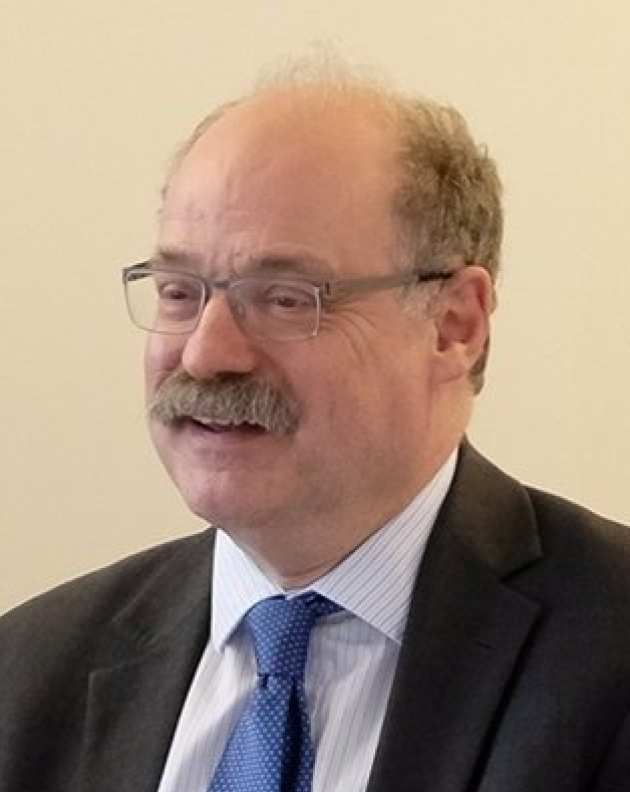 Sir Mark Walport, Chief Executive of UK Research and Innovation, discussed Gabor’s “Inventing the Future” with the benefit of 55 years of hindsight.
Sir Mark Walport, Chief Executive of UK Research and Innovation, discussed Gabor’s “Inventing the Future” with the benefit of 55 years of hindsight.
Sir Mark is Chief Executive of UK Research and Innovation, which brings together the seven Research Councils, Innovate UK and Research England.
He has been a champion for science, engineering and technology in his role as Government Chief Scientific Adviser, Head of the Government Office for Science and Co-Chair of the Prime Minister’s Council for Science and Technology.
As former Director of the Wellcome Trust, Sir Mark has experience running a large scale research organisation and global charitable foundation.A distinguished scientist in his own right, Sir Mark was also Professor of Medicine and Head of the Division of Medicine at Imperial College London.
Before becoming GCSA, he conducted independent reviews for the UK Government on the use and sharing of personal information in the public and private sectors: ‘Data Sharing Review’ (2009); and secondary education: ‘Science and Mathematics: Secondary Education for the 21st Century’ (2010).
He received a knighthood in the 2009 New Year Honours List for services to medical research and was elected as Fellow of The Royal Society in 2011.
2017 Dennis Gabor Lecture - Thursday 25th May 2017
Life After the App - How Humans Will Connect With Ubiquitous Sensing - Professor Jo Paradiso
We have already witnessed profound and often unanticipated developments as IoT starts to build out and the world is mediated via a mainly graphic wireless device held at arms length. But what will happen once the world is precognitively interpreted by what we term ‘sensory prosthetics’ that change what and how humans physically perceive, a world where your own intelligence is split ever more seamlessly between your brain and the cloud? Accordingly, this talk will overview the broad theme of interfacing humans to the ubiquitous electronic "nervous system" that sensor networks will soon extend across things, places, and people, going well beyond the ‘Internet of Things,’ to challenge the notion of physical presence. I'll illustrate this through two avenues of research - one looking at a new kind of digital "omniscience" (e.g., different kinds of browsers for sensor network data & agile frameworks for sensor representation) and the other looking at buildings & tools as "prosthetic" extensions of humans (e.g., making HVAC and lighting systems an extension of your natural activity and sense of comfort, or smart tools as human-robot cooperation in the hand), drawing from many projects that are running in my group at the MIT Media Lab and touching on technical areas ranging from wearable sensing/computing to spatialized audio and distributed sensor networks.
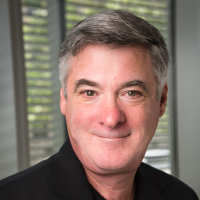 Joseph Paradiso is the Alexander W. Dreyfoos Professor at MIT's Program in Media Arts and Sciences. He directs the MIT Media Lab's Responsive Environments Group, which explores how sensor networks augment and mediate human experience, interaction and perception. He received a B.S. in electrical engineering and physics summa cum laude from Tufts University, and a Ph.D. in physics from MIT with Prof. Ulrich Becker in the Nobel Prize-winning group headed by Prof. Samuel C.C. Ting at the MIT Laboratory for Nuclear Science. Paradiso's research focuses include ubiquitous computing, embedded systems, sensor networks, wearable and body area networks, energy harvesting and power management for embedded sensors, and interactive media. He also designed and built one of the world's largest modular synthesizers, and has designed MIDI systems for the musicians Pat Metheny and Lyle Mays. The synthesizer currently streams live-generated audio over the internet.
Joseph Paradiso is the Alexander W. Dreyfoos Professor at MIT's Program in Media Arts and Sciences. He directs the MIT Media Lab's Responsive Environments Group, which explores how sensor networks augment and mediate human experience, interaction and perception. He received a B.S. in electrical engineering and physics summa cum laude from Tufts University, and a Ph.D. in physics from MIT with Prof. Ulrich Becker in the Nobel Prize-winning group headed by Prof. Samuel C.C. Ting at the MIT Laboratory for Nuclear Science. Paradiso's research focuses include ubiquitous computing, embedded systems, sensor networks, wearable and body area networks, energy harvesting and power management for embedded sensors, and interactive media. He also designed and built one of the world's largest modular synthesizers, and has designed MIDI systems for the musicians Pat Metheny and Lyle Mays. The synthesizer currently streams live-generated audio over the internet.
The 2016 Dennis Gabor Lecture was presented by Naomi Climer FREng BSc CEng FIET on Wednesday 18th May.
We’re on the edge of a fourth industrial revolution which is going to fundamentally change the way we live, work and communicate. This revolution is powered by a fusion of all the technologies that have come before, but to leverage the full scope of the opportunity will require new levels of collaboration between societies, industries, academia and governments. At the heart of this potential leap forward will be engineers conceiving and creating the infrastructure of our future. Naomi will talk about some of the ways that the world is likely to change and the importance of engineering as a key to delivering against the high-tech promise of the future.
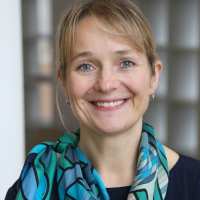 Naomi Climer FREng BSc CEng FIET is President of the Institution of Engineering and Technology (IET) - The IET is one of the world’s largest engineering professional bodies with Over 167,000 members in 127 countries. It is also the most multidisciplinary – to reflect the increasingly diverse nature of engineering in the 21st century.
Naomi Climer FREng BSc CEng FIET is President of the Institution of Engineering and Technology (IET) - The IET is one of the world’s largest engineering professional bodies with Over 167,000 members in 127 countries. It is also the most multidisciplinary – to reflect the increasingly diverse nature of engineering in the 21st century.
Until March 2015, Naomi was President of Sony’s Media Cloud Services, based in Los Angeles, USA, with a mission to develop cloud based, collaborative production services for the media industry worldwide. Previously, Naomi headed Sony’s B2B organisation across Europe (Sony Professional) covering diverse markets including media, broadcast, cinema, sports, security and healthcare. During her time with Sony Professional, she delivered organisational transformation, fostered new business development and led the acquisition of Hawk Eye – the line judging and sports statistics company.
After studying Chemistry with Management Science at Imperial, London, Naomi trained as an Engineer at the BBC and has worked in technical and leadership roles across BBC Radio, BBC World Service and BBC News as well as at ITV and in local radio. Naomi is a well known thought leader in the Broadcast and Media industry internationally and is an active campaigner for gender diversity within the engineering profession and beyond.
In her spare time, Naomi is chair of the UK Government (DCMS) Future Communications Challenge Group (FCCG) looking at the technology opportunities for the UK around 5G, chair of the International Broadcasting Convention (IBC) Council and a keen sailor, motorcyclist and all things outdoors.
The 2015 Dennis Gabor Lecture was presented by Professor Chris Toumazou FRS FREng on 23rd June 2015
U+ Life captures the idea for a brand that will encompass semiconductor technology and bring Microchips to life through Chronic Disease. As the population grows older the world is confronted with a mass of Chronic diseases such as Diabetes, Obesity, Cardiovascular disease, Renal disease etc., which we will try to manage better, otherwise the human financial costs will continue to escalate.
U+ Life provides personalised solutions for early detection, point of care diagnostics and therapeutics to help tackle the global problem of Chronic disease in a consumer oriented way.
The talk will focus on the Application of Microchip Technology to monitor and replicate Biology from early detection right through to Therapy.
A Microchip based Artificial Pancreas through to a Lab on Chip Genetic test will be discussed. U+ Life bridges lifestyle /epigenetics with applications ranging from the Beauty Industry through to Oncology.
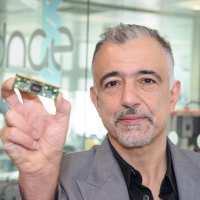 Professor Chris Toumazou, Regius Professor of Engineering, Chair in Biomedical Circuit Design, Director of the Centre for Bio-Inspired Technology and Founder and Chief Scientist for the Institute of Biomedical Engineering at Imperial College. He is Founder, Chairman or CEO of two successful Medical Device Companies (Toumaz Technology and DNA Electronics) and Chief Scientific Advisor to GENEU. He is distinguished for his innovative silicon technology and integrated circuit design for electronic device in the field of devices for medical diagnosis and therapy.
Professor Chris Toumazou, Regius Professor of Engineering, Chair in Biomedical Circuit Design, Director of the Centre for Bio-Inspired Technology and Founder and Chief Scientist for the Institute of Biomedical Engineering at Imperial College. He is Founder, Chairman or CEO of two successful Medical Device Companies (Toumaz Technology and DNA Electronics) and Chief Scientific Advisor to GENEU. He is distinguished for his innovative silicon technology and integrated circuit design for electronic device in the field of devices for medical diagnosis and therapy.
In 1994 Toumazou was appointed the youngest Professor ever to be appointed at Imperial College, at the age of 33. In 2013 he became London’s First Regius Professor of Engineering conferred to Imperial College during the Queen’s Diamond Jubilee. Toumazou’s research include cochlear implants for born-deaf children, an artificial pancreas for type 1 diabetics, wireless heart monitors for personalised ambulatory health monitoring pre- and post- operatively, inventing semiconductor-based DNA sequencing and inventing an intelligent neural stimulator as a drug alternative for obesity.
In 2008 he was appointed to the Fellowship of the Royal Academy of Engineering and the Fellowship of the Royal Society, which is the highest honour in UK science. He was appointed a Fellow of Academy of Medical Sciences in 2013 and is now one of the few who is a Fellow of three premium societies.
The 2014 Dennis Gabor Lecture was presented by Colin Smith CBE on 11th June 2014
For over 100 years Rolls-Royce has been at the leading edge of technology development for power and propulsion. In that time both aircraft and ships have become increasingly electrified, a trend which has increased sharply in the last decade, demonstrated by the Boeing 787 ‘More Electric Aircraft’ and the ‘Full Electric Propulsion’ Type 45 Destroyer.
In this lecture Colin Smith will discuss the history of electric technology development for aerospace and marine and present the future vision for aircraft propulsion, where the challenges of combining gas turbine and superconducting electrical technologies are great.
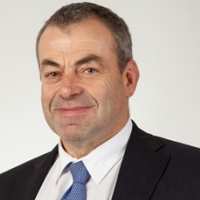 Colin Smith is Director – Engineering & Technology and a member of the Board of Rolls-Royce.
Colin Smith is Director – Engineering & Technology and a member of the Board of Rolls-Royce.
He joined Rolls-Royce as an undergraduate apprentice at the Leavesden engine factory in 1974, following graduation in Mechanical Engineering at the University of Southampton. He worked on a number of helicopter engine projects before becoming Chief Engineer of Small Engines at Rolls-Royce in Bristol.
Colin moved to Derby in 1994 to be Chief Engineer on the Trent 700 engine, followed by Head of Engineering for Compressors and Fans, and then Chief Engineer of the Trent 500 engine. In May 2001 he was appointed as Director of Engineering & Technology for Civil Aerospace and subsequently Director of Research & Technology in 2005.
Colin was awarded a CBE (Commander of the Order of the British Empire) in the Queen’s Birthday honours 2012. He is a Fellow of the Royal Academy of Engineering, The Royal Aeronautical Society and The Institution of Mechanical Engineers and was a Royal Academy Silver Medal winner in 2002. He was awarded an Honorary Doctorate of Science by the University of Strathclyde in June 2007, an Honorary Doctorate of Science by the University of Southampton in July 2008, an Honorary Doctorate of Technology by Loughborough University in 2010 and an Honorary Doctorate of Science by the University of Oxford in June 2013
The 2013 Dennis Gabor Lecture was presented by Professor Laszlo Solymar on 12th June 2013
Laszlo Solymar was born in Hungary. In 1956 he settled in England. After nine years in British industry he joined the University of Oxford where he is now an Emeritus Professor of Applied Electromagnetism.
During his career he had visiting professorships at the Universities of Paris, Copenhagen, Osnabruck, Berlin, Madrid, Budapest and, since 2000, Imperial College London. He did research on antennas, microwaves, superconductors, holographic gratings, photorefractive materials and metamaterials. He has published seven books (three research books, three textbooks and one popular book) and 300 papers.
In 1992 he received the Faraday Medal of the Institution of the Electrical Engineers and he was elected to the Royal Society in 1995. His further interests are represented by his book on the history of communications, his radio-plays with John Wain on three scientists of the ancient world and his two plays entitled ‘The Rhineland War: 1936’ and ‘The Portrait of a Genius’.
The 2012 Dennis Gabor Lecture was presented by Professor Sir Richard Friend FRS on 8th February 2012
Pi-conjugated organic molecules and polymers now provide a set of well-performing semiconductors that support a wide range of devices, including light-emitting diodes (LEDs) as used in smart-phone displays, field-effect transistors (FETs) and photovoltaic diodes (PVs). These are attractive materials to manufacture, particularly for large-area applications where they be processed by direct printing. In this talk I will illustrate those aspects of the physics of their electronic properties that distinguish them from inorganic semiconductors, and that have required specific engineering of material and device design. In particular, these materials have low dielectric constants, and the consequently poor screening of Coulomb interactions causes electron-hole excitations (excitons) to be strongly bound. This often gives very high luminescence efficiency, as required for use in LEDs. For PVs, splitting of excitons to form free electrons and holes can be achieved efficiently at heterojunctions formed between materials with different electronegativities, which act as electron ‘donor’ and ‘acceptor’. The design of device architecture to provide the required large heterojunction interfacial area has been developed with considerable success.
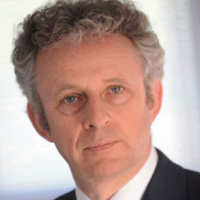 Professor Richard Friend FRS, is the Cavendish Professor of Physics in the University of Cambridge. He has developed the study of organic polymers as semiconductors, and his research group has demonstrated that these materials can be used in wide range of semiconductor devices, including light-emitting diodes and transistors and solar cells. He co-founded Cambridge Display Technology Ltd in 1992 to develop light-emitting diode displays and Plastic Logic Ltd in 2000, to develop polymer transistor circuits that are now being developed as flexible active-matrix backplanes for e-paper displays.
Professor Richard Friend FRS, is the Cavendish Professor of Physics in the University of Cambridge. He has developed the study of organic polymers as semiconductors, and his research group has demonstrated that these materials can be used in wide range of semiconductor devices, including light-emitting diodes and transistors and solar cells. He co-founded Cambridge Display Technology Ltd in 1992 to develop light-emitting diode displays and Plastic Logic Ltd in 2000, to develop polymer transistor circuits that are now being developed as flexible active-matrix backplanes for e-paper displays.